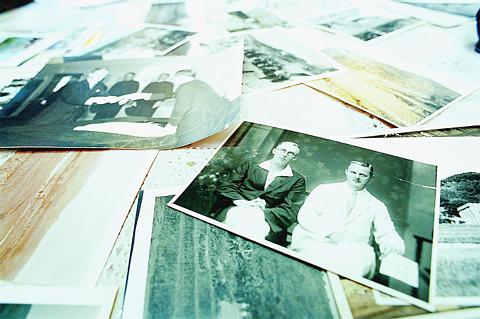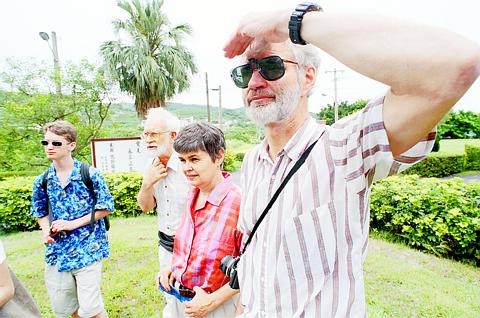For Alan Taylor, a Canadian geophysicist, a recent visit to Pali township in Taipei County on a bright summer day was more than just his first trip to Taiwan. It was a journey rich in historical significance, allowing him to catch a glimpse of the contribution his uncle made to a remote Asian country more than 60 years ago.
Taylor, accompanied by his wife and son, came to Pali, the small town opposite Tamsui across the Tamsui River, to visit the Happy Mount Colony (
The site, which presently accommodates 105 people with various mental disabilities, was founded in 1934 by Dr George Gushue-Taylor (

PHOTO: CHEN CHENG-CHANG, TAIPEI TIMES
"I only met my uncle twice [due to a vast age gap], but the family was in awe of what he did. At a time when nobody [in Canada] really knew where Taiwan was, my uncle chose to settle in an under-developed island in Asia to work on the eradication of leprosy with his medial expertise," said Taylor.
"The only memory I can clearly recall was that when I met him, I asked him to give me a Chinese name. I thought it a really cool thing as a child," he added.
"He was well-known for his frugality. My aunt once told me that she used to receive letters he [my uncle] sent from Taiwan, using recycled envelopes."

PHOTO: CHEN CHENG-CHANG, TAIPEI TIMES
While standing on top of the hill, where the institution was built, Taylor paused to enjoy a bird's eye view of the Tamsui River, attempting to envision what it had looked like when his uncle chose the spot in 1931.
Comparing the view with the dozens of photos he brought along, the landscape appeared intact -- the winding river still runs and the surrounding vegetation is still flourishing. What has changed is that the leprosarium was turned into a center for the mentally disabled in 1971.
"I am sure my uncle would be pleased with its transformation. Lepers and the mentally challenged are similar in the sense that they are both regarded as outcasts in society. Now that leprosy has been eradicated in Taiwan, what they are doing -- lending a helping hand to the mentally disabled -- is equally substantial," said Taylor.
Dr Gushue-Taylor was born on Dec. 5 in 1883 in Ray Roberts, Newfoundland, Canada. He was trained as a physician in London and became a fellow of the Royal College of Physicians and Surgeons -- the highest medical honor at the time.
The doctor's work with leprosy dates back to 1911, when he was assigned by the Presbyterian Church of England to come to Taiwan.
Upon arrival, he saw a case of leprosy and he was deeply moved by the plight of leprosy sufferers. At that time, leprosy patients were rejected by society because their condition was thought to be incurable; they were also considered by superstitious people to be living under a curse.
The doctor refused to accept the idea that leprosy was an incurable disease. To him it was just a disease, and one that could be cured. His conviction prompted his research on leprosy and on measures of treatment for the disease.
In Taipei, the doctor opened the first special out-patient clinic for lepers in 1925 in connection with the Mackay Memorial Hospital (馬偕醫院), where he served as superintendent from 1923 to 1936. But the site soon became overcrowded. At the time, the doctor estimated the total number of lepers in Taiwan to be more than 4,000, and possibly even double that number.
Aware of the prevalence of the disease, the doctor realized that out-patient clinics were not sufficient to deal with the problem and decided to plan for a residential colony where patients could be kept, treated and studied under daily professional care.
In 1931, with the aid of Taiwanese Pastor Keh (
The most important thing in the doctor's mind was an adequate source of water. The colony, with an area of nearly 40 hectares, was officially opened on March 30, 1934 with the assistance of another missionary, Dr Hugh MacMillan.
Gushue-Taylor and his wife, Margery, who worked as the superintendent of nurses, were the founders of relief work for those suffering from leprosy in Taiwan.
"The study of leprosy and its treatment were officially initiated by the doctor during his stay at the colony from 1934 to 1940," said Johann Chao (
Gushue-Taylor came across as a very stern figure, diligent and devoted to his job. He was devoted to his patients, but at the same time very demanding, Chao said, recalling his contact with the doctor in the early 1950s.
"Dr and Mrs Gushue-Taylor did not have any children because Mrs Gushue-Taylor had uterine cancer. It probably was a source of sadness for them; however, it was never a major regret because they had no perception that the primary purpose for marriage was to produce offspring," said Chao.
"What was more meaningful [for them] was to follow the doctrine of Christianity to help others. He therefore chose to better the life of human beings by making use of his medical prowess."
His never shied away from his resolution to carry out his mission to eradicate leprosy, despite the tremendous obstacles faced by him. "It was his religious upbringing that enabled him to sustain his determination to fight against leprosy, because he held the conviction that to `cleanse the lepers' was a calling sent to him from his master -- Jesus Christ," Alan Taylor said.
The doctor carried on with his mission of ridding the island of leprosy until 1940. During World War II, he was forced to leave Taiwan under accusation of being a secret agent by the Japanese army.
Reports show that nearly 1000 leprosy patients were cured at the Happy Mount Colony after it was established.
The doctor returned to Taiwan after World War II for the first time in 1952 and held discussions with the China Inland Mission, asking for them to provide medical assistance to the Happy Mount Colony.
In 1953, he came back to Taiwan again to help resolve a dispute with the government concerning the ownership of the property.
The doctor died of acute peritonitis on April 23, 1954 at the age of 72, while traveling back to Canada by boat. Historical documents record that before he died he told the boat's crew that he wanted his remains laid to rest at Happy Mount, because Formosa was the land where his career and spirit were closely connected.
The doctor's undertaking regarding the treatment of leprosy, fortunately, was not interrupted after his death. Dr Hugh MacMillan carried on his mission by founding the TLRA in 1955 to assist those afflicted with leprosy nationwide.
"The Doctor's death was like a kernel of wheat that fell into the furrows of the earth. His death has produced many new wheat kernels -- a plentiful harvest of new lives," according to an excerpt from an essay, written by Chao, in commemoration of the 50th anniversary of Happy Mount Colony.

CHAOS: Iranians took to the streets playing celebratory music after reports of Khamenei’s death on Saturday, while mourners also gathered in Tehran yesterday Iranian Supreme Leader Ayatollah Ali Khamenei was killed in a major attack on Iran launched by Israel and the US, throwing the future of the Islamic republic into doubt and raising the risk of regional instability. Iranian state television and the state-run IRNA news agency announced the 86-year-old’s death early yesterday. US President Donald Trump said it gave Iranians their “greatest chance” to “take back” their country. The announcements came after a joint US and Israeli aerial bombardment that targeted Iranian military and governmental sites. Trump said the “heavy and pinpoint bombing” would continue through the week or as long

TRUST: The KMT said it respected the US’ timing and considerations, and hoped it would continue to honor its commitments to helping Taiwan bolster its defenses and deterrence US President Donald Trump is delaying a multibillion-dollar arms sale to Taiwan to ensure his visit to Beijing is successful, a New York Times report said. The weapons sales package has stalled in the US Department of State, the report said, citing US officials it did not identify. The White House has told agencies not to push forward ahead of Trump’s meeting with Chinese President Xi Jinping (習近平), it said. The two last month held a phone call to discuss trade and geopolitical flashpoints ahead of the summit. Xi raised the Taiwan issue and urged the US to handle arms sales to

BIG SPENDERS: Foreign investors bought the most Taiwan equities since 2005, signaling confidence that an AI boom would continue to benefit chipmakers Taiwan Semiconductor Manufacturing Co’s (TSMC, 台積電) market capitalization swelled to US$2 trillion for the first time following a 4.25 percent rally in its American depositary receipts (ADR) overnight, putting the world’s biggest contract chipmaker sixth on the list of the world’s biggest companies by market capitalization, just behind Amazon.com Inc. The site CompaniesMarketcap.com ranked TSMC ahead of Saudi Aramco and Meta Platforms Inc. The Taiwanese company’s ADRs on Tuesday surged to US$385.75 on the New York Stock Exchange, as strong demand for artificial intelligence (AI) applications led to chip supply constraints and boost revenue growth to record-breaking levels. Each TSMC ADR represents

State-run CPC Corp, Taiwan (CPC, 台灣中油) yesterday said that it had confirmed on Saturday night with its liquefied natural gas (LNG) and crude oil suppliers that shipments are proceeding as scheduled and that domestic supplies remain unaffected. The CPC yesterday announced the gasoline and diesel prices will rise by NT$0.2 and NT$0.4 per liter, respectively, starting Monday, citing Middle East tensions and blizzards in the eastern United States. CPC also iterated it has been reducing the proportion of crude oil imports from the Middle East and diversifying its supply sources in the past few years in response to geopolitical risks, expanding